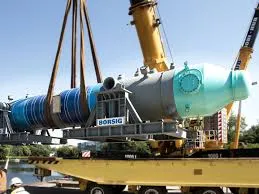Comprehensive Maintenance Solutions for Oil-Fired Hot Water Boiler Efficiency and Longevity
The Importance of Regular Service for Oil Forced Hot Water Boilers
Oil forced hot water boilers play a crucial role in providing heating for residential and commercial buildings. They use oil as a fuel source to heat water, which is then circulated through pipes to radiators or baseboard heating systems. To ensure optimal performance and extend the lifespan of these systems, regular servicing is essential.
Understanding the Mechanism
Before delving into the importance of servicing, it's vital to understand how oil forced hot water boilers function. These systems ignite oil to produce heat, which warms water in a sealed tank. The heated water is pumped through the system, delivering warmth where it's needed. Effective operation hinges on various components, including the burner, heat exchanger, pump, and control systems. Over time, wear and tear can affect these components, leading to inefficiency or potential failure.
Benefits of Regular Servicing
1. Improved Efficiency Regular maintenance can significantly enhance the efficiency of an oil boiler. During a service, a technician checks and cleans the burner, ensuring it operates at peak efficiency. This not only leads to better heating performance but also reduces fuel consumption, which translates into lower energy bills for homeowners and businesses.
2. Increased Lifespan Just like any other mechanical system, oil boilers require routine care to function smoothly. Neglecting maintenance can lead to severe issues, such as leaks or breakdowns, which may necessitate costly repairs or even complete replacement. A well-maintained boiler can last significantly longer, providing a better return on investment.
3. Safety Assurance Safety is paramount when dealing with heating systems, especially those that use combustible fuels like oil. Regular service checks help identify potential hazards, such as carbon monoxide leaks or malfunctioning parts. Technicians inspect all components, ensuring they are working correctly and safely, reducing the risk of accidents and ensuring peace of mind for users.
oil forced hot water boiler service

4. Early Problem Detection One of the key advantages of routine servicing is the ability to identify and address problems before they escalate. During a typical maintenance visit, technicians can spot wear on parts or notices changes in system performance. Early intervention can prevent small issues from developing into major, expensive repairs.
5. Compliance with Regulations Depending on the region, there may be legal requirements for maintaining heating systems, including oil boilers. Regular servicing not only ensures that systems comply with local laws and regulations but also helps maintain homeowners’ insurance coverage. In the event of an incident, proof of regular maintenance may be required for a successful claim.
What to Expect During a Service
A standard service for an oil forced hot water boiler typically includes various tasks that ensure the system is functioning correctly. Technicians will
- Inspect and clean the burner and heat exchanger - Check the fuel supply and pressure - Test efficiency levels and adjust settings if necessary - Inspect the electrical components and controls - Examine the emergency shutoff and safety devices - Replace filters and any worn-out parts
Conclusion
In conclusion, regular servicing of oil forced hot water boilers is essential for maintaining efficient and safe heating systems. Homeowners and business operators should prioritize these maintenance routines to improve performance, extend the life of their equipment, and ensure compliance with safety regulations. Investing in regular service not only saves money in the long run but also provides peace of mind, knowing that your heating system is operating safely and effectively. By working with qualified technicians, you can keep your oil boiler running smoothly for years to come.
-
Electric Steam Boiler Manufacturers: Efficient Industrial SolutionsNewsAug.15,2025
-
Leading Electric Steam Boiler Manufacturers for IndustryNewsAug.14,2025
-
Buy Waste Heat Boilers: Custom, Efficient & Affordable SolutionsNewsAug.13,2025
-
Electric Steam Boiler Manufacturers | Industrial Power & EfficiencyNewsAug.12,2025
-
Electric Steam Boiler Manufacturers: Efficient & Reliable SolutionsNewsAug.11,2025
-
China Steam Boiler Price: Efficient Industrial Systems & BurnersNewsAug.10,2025

